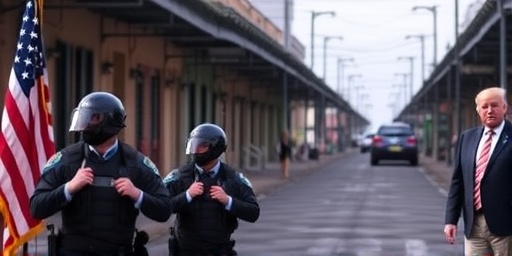In a decisive move to intensify immigration enforcement, President Donald Trump has ordered the deployment of more than 200 federal agents to New Orleans, marking a significant escalation in the administration’s nationwide crackdown on illegal immigration. This operation, announced late Thursday, targets undocumented individuals and aims to bolster border security efforts deep within the heart of Louisiana’s vibrant port city.
- Federal Agents Gear Up for Targeted Raids in the Crescent City
- New Orleans Communities Brace for Immigration Enforcement Wave
- Trump’s Immigration Strategy Roots in Broader National Push
- Local Leaders and Experts Debate Long-Term Ramifications
- Looking Ahead: Challenges and Opportunities in Enforcement Evolution
The initiative comes amid rising tensions over immigration policies, with Trump‘s administration emphasizing a zero-tolerance approach that has drawn both praise from supporters and criticism from civil rights advocates. Federal officials, including agents from Immigration and Customs Enforcement (ICE) and Customs and Border Protection (CBP), are expected to arrive in the coming days, focusing on high-traffic areas such as the French Quarter, warehouse districts, and residential neighborhoods with large immigrant populations.
According to a White House statement, the deployment is part of a broader strategy to address what Trump described as ‘a crisis at our borders that spills into every American city.’ The president highlighted New Orleans’ role as a major entry point for goods and people, stating in a tweet: ‘New Orleans is a gateway to America—time to secure it from illegal immigration. Federal agents are on the way!’ This action follows similar operations in cities like Los Angeles and Chicago, where federal agents have conducted raids leading to hundreds of arrests.
Federal Agents Gear Up for Targeted Raids in the Crescent City
As federal agents prepare to descend on New Orleans, details of the operation reveal a meticulously planned effort to disrupt networks involved in illegal immigration. Sources within the Department of Homeland Security (DHS) indicate that the 200-plus agents will be divided into specialized teams, including tactical units for raids and intelligence gatherers for surveillance. The primary focus will be on workplaces suspected of employing undocumented workers, such as construction sites, restaurants, and shipping facilities along the Mississippi River.
Statistics from recent DHS reports underscore the urgency of the crackdown. In fiscal year 2023, ICE apprehended over 140,000 individuals nationwide, with Louisiana reporting a 15% increase in immigration-related detentions compared to the previous year. New Orleans, with its population of approximately 390,000, hosts an estimated 50,000 foreign-born residents, many of whom arrived through legal channels but face scrutiny amid heightened enforcement.
Local law enforcement has been briefed on the operation, with New Orleans Police Department Superintendent Shaun Ferguson confirming coordination efforts. ‘We support federal partners in upholding the law, but our priority remains community safety,’ Ferguson said in a press conference. However, concerns linger about potential overlaps with local policing, especially in a city still recovering from the scars of Hurricane Katrina and ongoing crime challenges.
The deployment also includes advanced technology, such as drones for aerial monitoring and data analytics to track migration patterns. One expert from the Migration Policy Institute noted, ‘This isn’t just boots on the ground; it’s a data-driven assault on immigration networks that could reshape urban demographics in New Orleans.’
New Orleans Communities Brace for Immigration Enforcement Wave
The announcement has sent ripples through New Orleans’ diverse communities, where immigrant contributions to the city’s cultural and economic fabric are undeniable. From the soulful jazz scenes in the Tremé neighborhood to the bustling markets of Central City, undocumented workers play key roles in sustaining the local economy. A 2022 study by the New Orleans-based Urban League found that immigrants contribute over $2 billion annually to the region’s GDP, primarily through labor in hospitality and construction sectors.
Reactions from community leaders have been swift and polarized. Maria Gonzalez, executive director of the Louisiana Immigrant Rights Coalition, decried the move as ‘a heavy-handed tactic that terrorizes families.’ In an interview, Gonzalez shared stories of families living in fear: ‘We’ve already seen parents skipping work and children afraid to go to school. This crackdown under Trump will exacerbate vulnerabilities in our already fragile communities.’
On the other side, supporters like Republican Congressman Steve Scalise, who represents parts of Louisiana, applauded the initiative. ‘President Trump’s bold action with federal agents in New Orleans is exactly what we need to protect American jobs and secure our borders,’ Scalise stated on social media. Local business owners in the tourism industry, which employs thousands of immigrants, expressed mixed feelings, with one French Quarter restaurateur anonymously telling reporters, ‘These workers keep our doors open—raids could cripple us during Mardi Gras season.’
To mitigate immediate impacts, advocacy groups are organizing rapid-response networks. These include legal aid hotlines and know-your-rights workshops, drawing from experiences in other cities hit by similar operations. For instance, during a 2019 ICE raid in Mississippi, over 680 people were detained, prompting a surge in community support systems that New Orleans activists are now replicating.
Trump’s Immigration Strategy Roots in Broader National Push
This deployment to New Orleans fits into President Trump’s long-standing immigration agenda, which has evolved since his 2016 campaign promises of building a border wall and ending sanctuary city policies. The administration’s crackdown has intensified post-2020 election, with executive orders expanding ICE’s authority to conduct arrests without judicial warrants in certain cases. DHS data shows a 25% uptick in interior enforcement actions since January 2021, targeting not just border crossers but also visa overstays and asylum seekers.
New Orleans’ selection as a focal point isn’t arbitrary. As America’s largest port by cargo tonnage, it handles millions of containers yearly, some of which officials claim are exploited by smuggling rings. A 2023 Government Accountability Office report highlighted vulnerabilities in port security, noting that immigration fraud cases linked to New Orleans shipping rose by 18% over five years. Trump’s order aims to address these gaps, with federal agents partnering with the U.S. Coast Guard for riverine patrols.
Historically, immigration enforcement in Louisiana has ebbed and flowed with political tides. During the Obama era, focus was on criminals, leading to fewer deportations of non-violent immigrants. Under Trump, the net has widened, affecting families and long-term residents. Legal challenges abound; the ACLU has already filed a lawsuit in federal court, arguing that the deployment violates due process rights. ‘This is executive overreach,’ said ACLU attorney Rachel Liu, predicting court battles that could delay operations.
Economically, the crackdown could have ripple effects. The Port of New Orleans supports 107,000 jobs statewide, many held by immigrants. Disruptions might lead to labor shortages, echoing issues seen in California’s agricultural sectors after similar raids. Economists from Tulane University estimate potential short-term losses of up to $500 million if enforcement disrupts key industries.
Local Leaders and Experts Debate Long-Term Ramifications
As federal agents mobilize, New Orleans’ political landscape is abuzz with debate over the operation’s sustainability. Mayor LaToya Cantrell, a Democrat, has urged restraint, emphasizing the city’s status as a welcoming hub for diverse cultures. In a statement, Cantrell said, ‘While we respect federal authority on immigration, we must protect the humanity at the core of our city. New Orleans thrives on inclusion, not division.’
Experts weigh in on the broader implications. Dr. Elena Ramirez, a sociologist at Xavier University, points to social costs: ‘Past crackdowns have led to increased poverty rates among affected families and strained social services. In New Orleans, with its high poverty levels at 23%, this could overwhelm already stretched resources.’ She cites a 2021 Pew Research study showing that deportations correlate with higher dropout rates among children of immigrants.
Conversely, security analysts praise the move. Former ICE Director Thomas Homan, now a Trump advisor, argued in a Fox News interview, ‘Deploying federal agents to New Orleans sends a clear message: No city is off-limits in our fight against illegal immigration. It’s about rule of law.’ Homan referenced success stories from Texas operations, where arrests dropped recidivism in smuggling by 30%.
Health and education sectors are also on alert. The Louisiana Department of Health reports that immigrant communities rely heavily on public clinics; disruptions could spike uncompensated care costs. Schools in districts like Orleans Parish, serving 10,000 English-language learners, are preparing contingency plans to shield students from enforcement actions during school hours.
Looking Ahead: Challenges and Opportunities in Enforcement Evolution
Looking forward, the New Orleans deployment could set precedents for future immigration actions under Trump. If successful, it might expand to other Gulf Coast cities like Houston and Mobile, forming a regional enforcement corridor. DHS has allocated $150 million in additional funding for such initiatives, signaling sustained commitment.
However, opposition is mounting. Protests are planned for this weekend, organized by groups like United We Dream, expecting thousands to rally against what they call a ‘fear-mongering crackdown.’ International ramifications loom too; Mexico and Central American nations have criticized U.S. policies, potentially straining diplomatic ties and trade agreements.
For residents, the coming weeks will test resilience. Community organizations are fundraising for bail funds and legal defense, while businesses adapt by verifying worker statuses to avoid fines—up to $16,000 per undocumented employee under federal law. Ultimately, this operation underscores the ongoing national dialogue on immigration: balancing security with compassion in a nation built by newcomers.
As federal agents integrate into New Orleans’ streets, the city watches closely, hoping to navigate this chapter without fracturing its unique spirit. The implications for policy, economy, and society will unfold in real time, shaping America’s approach to immigration for years to come.








